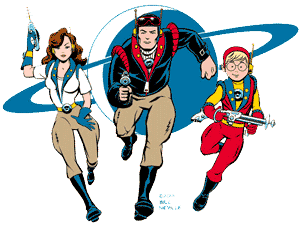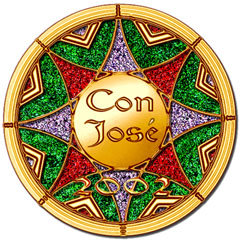
A science-fiction fanzine is an amateur or semi-professional magazine published by members of science-fiction fandom, from the 1930s to the present day. They were one of the earliest forms of fanzine, within one of which the term "fanzine" was coined, and at one time constituted the primary type of science-fictional fannish activity ("fanac").

The Hugo Award for Best Fanzine is given each year for non professionally edited magazines, or "fanzines", related to science fiction or fantasy which has published four or more issues with at least one issue appearing in the previous calendar year. Awards were also once given out for professional magazines in the professional magazine category, and since 1984 have been awarded for semi-professional magazines in the semiprozine category; several magazines that were nominated for or won the fanzine category have gone on to be nominated for or win the semiprozine category since it was established. The Hugo Awards have been described as "a fine showcase for speculative fiction" and "the best known literary award for science fiction writing".
The Locus Awards are an annual set of literary awards by the science fiction and fantasy magazine Locus, a monthly based in Oakland, California, United States. The award winners are selected by polling magazine readers.
Mike Glyer is both the editor and publisher of the long-running science fiction fan newszine File 770. He has won the Hugo Award 11 times in two categories: File 770 won the Best Fanzine Hugo in 1984, 1985, 1989, 2000, 2001 2008, and 2016. Glyer won the Best Fan Writer Hugo in 1984, 1986, 1988, and 2016. The 1982 World Science Fiction Convention (Worldcon) committee presented Glyer a special award in 1982 for "Keeping the Fan in Fanzine Publishing."
George H. Scithers was an American science fiction fan, author and editor.

Emerald City was a science fiction fanzine published in print and on the internet by Cheryl Morgan. She had assistance from Kevin Standlee and Anne Murphy. The magazine published 134 regular issues and 6 special issues between September 1995 and October/November 2006. Emerald City received several Hugo Award nominations during its run, winning once in 2004 in the Best Fanzine category.
Locus: The Magazine of The Science Fiction & Fantasy Field, is an American magazine published monthly in Oakland, California. It is the news organ and trade journal for the English language science fiction and fantasy fields. It also publishes comprehensive listings of all new books published in the genres. The magazine also presents the annual Locus Awards. Locus Online was launched in April 1997, as a semi-autonomous web version of Locus Magazine.

Charles Nikki Brown was an American publishing editor, the co-founder and editor of Locus, the long-running news and reviews magazine covering the genres of science fiction and fantasy literature. Brown was born on June 24, 1937 in Brooklyn, New York. He attended City College until 1956, when he joined the military at age 18; Brown served in the United States Navy for three years. Following his discharge from navy service, he went to work as a nuclear engineer but later on changed careers and entered the publishing field; Brown became a full-time science fiction editor with Locus in 1975.

The 62nd World Science Fiction Convention (Worldcon) was Noreascon 4, which was held in Boston, Massachusetts, from September 2–6, 2004. The venues for the 62nd Worldcon were Hynes Convention Center, Sheraton Boston Hotel and Boston Marriott Copley Place. The convention was organized by Massachusetts Convention Fandom, Inc., and the organizing committee was chaired by Deb Geisler.

Annalee Newitz is an American journalist, editor, and author of both fiction and nonfiction, who has written for the periodicals Popular Science and Wired. From 1999 to 2008 Newitz wrote a syndicated weekly column called Techsploitation, and from 2000 to 2004 was the culture editor of the San Francisco Bay Guardian. In 2004 Newitz became a policy analyst at the Electronic Frontier Foundation. With Charlie Jane Anders, they also co-founded Other magazine, a periodical that ran from 2002 to 2007. From 2008 to 2015 Newitz was Editor-in-Chief of Gawker-owned media venture io9, and subsequently its direct descendant Gizmodo, Gawker's design and technology blog. As of 2019, Newitz is a contributing opinion writer at The New York Times.
John Frederick Hertz is a California lawyer and long-time Los Angeles, California science fiction fan.

ConJose was the 60th World Science Fiction Convention, held in San Jose, California on August 29-September 2, 2002. The convention was held in the McEnery Convention Center, as well as the Fairmont San Jose and the Hilton San Jose & Towers. ConJose was co-chaired by Tom Whitmore and Kevin Standlee and organized under the auspices of San Francisco Science Fiction Conventions.
Aussiecon Three was the 57th World Science Fiction Convention, held in Melbourne, Australia on 2–6 September 1999. The convention was held in the Melbourne Convention and Exhibition Centre.

Charlie Jane Anders is an American writer and commentator. She has written several novels and is the publisher of other magazine, the "magazine of pop culture and politics for the new outcasts". In 2005, she received the Lambda Literary Award for work in the transgender category, and in 2009, the Emperor Norton Award. Her 2011 novelette Six Months, Three Days won the 2012 Hugo and was a finalist for the Nebula and Theodore Sturgeon Awards. Her 2016 novel All the Birds in the Sky was listed No. 5 on Time magazine's "Top 10 Novels" of 2016, won the 2017 Nebula Award for Best Novel, the 2017 Crawford Award, and the 2017 Locus Award for Best Fantasy Novel; it was also a finalist for the 2017 Hugo Award for Best Novel. With her partner Annalee Newitz, she won the 2019 Hugo “Best Fancast” Award for their podcast “Our Opinions Are Correct“.
The 52nd World Science Fiction Convention (Worldcon), also known as ConAdian, was held 1–5 September 1994 at the Crowne Plaza, Place Louis Riel, and Sheraton hotels, and the Winnipeg Convention Centre in Winnipeg, Manitoba, Canada.
The single largest online distribution point for science fiction fanzines, eFanzines was launched by Bill Burns on 7 December 2000 and recorded its 500,000th visit in December 2008. It was nominated for a Hugo Award for "best web site" in 2005, one of only two occasions that category has appeared on the ballot. It's been a central part of opening up the science fiction fanzine world, which used to be difficult to find for those who weren't already part of if.

The Hugo Award is an annual literary award for the best science fiction or fantasy works and achievements of the previous year, given at the World Science Fiction Convention and chosen by its members. The Hugo is widely considered the premier award in science fiction. The award is administered by the World Science Fiction Society. It is named after Hugo Gernsback, the founder of the pioneering science fiction magazine Amazing Stories. Hugos were first given in 1953, at the 11th World Science Fiction Convention, and have been awarded every year since 1955.
Rachel Swirsky is an American literary, speculative fiction and fantasy writer, poet, and editor living in Oregon. She was the founding editor of the PodCastle podcast and served as editor from 2008 to 2010. She served as vice president of the Science Fiction and Fantasy Writers of America in 2013.

Tangent Online is an online magazine launched in its online incarnation in 1997, though it began as a print magazine in 1993. Tangent Online is edited by Dave Truesdale, with web-hoster Eric James Stone. The magazine covers reviews of science fiction and fantasy short fiction as well as providing classic interviews, articles, and editorials. According to the late SF historian Sam Moskowitz, Tangent was the first of its kind in the history of the SF field to review short science fiction and fantasy exclusively.

Cheryl Morgan is a Hugo Award-winning British science fiction critic and publisher. She is the owner of Wizard's Tower Press and the Wizard's Tower Books ebook store before it closed due to changes in EU regulation, and is the editor of Salon Futura magazine. She is a director of San Francisco Science Fiction Conventions Inc., and was a founder of the Association for the Recognition of Excellence in SF & F Translation. She was a part of the team running Science Fiction Awards Watch, and was non-fiction editor of Clarkesworld Magazine Magazine from 2009–2011. She was previously the editor of the Hugo award-winning Emerald City fanzine.